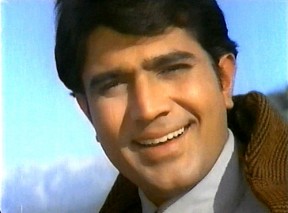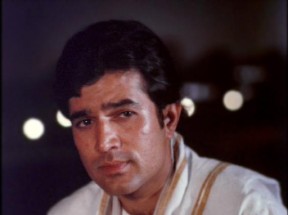My first memory of Rajesh Khanna is the song, “Accha Toh Hum Chalte Hain (Aan Milo Sajna, 1970) and of me sighing exaggeratedly like he did in the song. And of listening to his songs from Mere Jeevan Sathi (1972) in an Assamese cantonment and trying to sing, “Mera Naam Hai Shabnam” (Kati Patang 1970) and then crying out aloud when my mother cut out his face from Filmfare to line a cake tin. And trying to watch Joru Ka Ghulam again and again for the scene where the monkeys enter his kitchen and mess it up. Some of these memories found their way in my book Perfect Eight. The fact is that there was a time when you did not have to be a certain age or a film buff to know who Rajesh Khanna was. He just was. And you knew. Decades before the age of stage managed PR stunts that attempt to turn one film wonders into superstars of the future, this was a success story of a boy who seemed to have been kissed by luck right from the time he was born.
***
We all know that he is the adopted son of an affluent family and was known to “struggle” in an Impala at a time when the likes of Amitabh Bachchan were living with friends like Mehmood in Mumbai so that they could knock on charmed doors without having to worry about a roof above their heads. He also won the 1965 All India Talent Contest organised by United Producers and Filmfare. I recently watched once again his first release, Chetan Anand’s Aakhri Khat (1966) and though the film was heart-breakingly poignant in its attempt to capture a lost baby’s travails in a self-absorbed Mumbai, it was Khanna who you remembered singing to a doe-eyed Indrani Mukherjee, “Aur Kuch Der Thaher..Aur Kuch Der Na Ja.” and then you suddenly understood why for a decade or more, he had become box-office gold. He is possibly the first male actor who brought into romance, a tantalising sub-text of sensuality.
***
This was not the loose-lipped passion of Shammi Kapoor, the unexpressed intensity of Guru Dutt,the stylised longing of Dev Anand, the muscled showmanship of Dharmendra, the gentle poetry of Dilip Kumar, the playfulness of Shashi Kapoor or the occasionally brutish fervour of Raj Kapoor. This was something else. Somewhere through Raaz (1967), Baharon Ke Sapne (1967) and Ittefaq, Rajesh Khanna discovered himself. He channeled something that was as elusive as a whiff of musky perfume escaping from a bottle. It was an overture, a hint, an unspoken invitation towards something forbidden, dangerously seductive. Since the actors in that era were not allowed to kiss on screen, Rajesh Khanna lowered his gaze and blinked or nodded as if to make up for it. And his smile was almost a weapon of mass seduction. It was a conspiratorial smile. Intimate and suggestive. Like a dialogue that only he and the woman before him could hear. And the world was never the same again.
***
No one in Hindi cinema has been lusted and longed for as much as Rajesh Khanna. In a repressed country where passion was considered unholy and unrealistic, he was a flesh-and-blood fantasy longing for itself. He was the dashing pilot of Aradhana, the first love of Andaaz..someone a woman would consummate her longings fleetingly with and then pine over his loss forever. The playboy artist of Mere Jeevan Saathi ready to be reformed by a amber eyed, good woman. The eternally devoted lover of Amar Prem who looks at a supposed sex worker in a hell hole as she sings a Krishna bhajan and tears up because he has glimpsed her soul and when she stops, he entreats, “Ruk Kyon Gayiin..Gayie Na.” He was the family rebel of Do Raaste who found time between domestic bickering to serenade Mumtaz with, “Yeh Reshmi Zulfein.” The silken kurta clad young nawab of Mehboob Ki Mehndi who romanced a ‘chilman‘ behind which Leena Chandavarkar melted away like a sugar cube in summer. He could not dance or grow violent convincingly but was a collective dream waiting to exhale. A dream that film after film celebrated with glorious colours and music. He had great comic timing, a delicious musicality which paired with the voice of Kishore Kumar and the leading music directors of that time and cinemasmiths like Shakti Samanta contributed to his rise.
***







